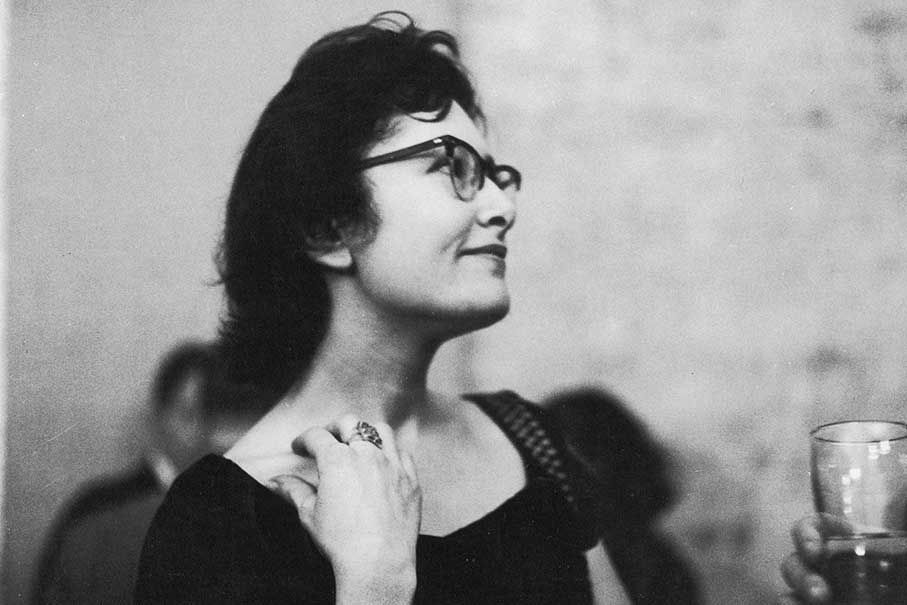The secret by denise levertov – As “The Secret” by Denise Levertov takes center stage, this opening passage beckons readers into a world crafted with poetic brilliance and insightful observations. Levertov’s verses delve into the depths of secrecy, revelation, and the elusive nature of truth, promising an exploration that is both thought-provoking and emotionally resonant.
This literary analysis embarks on a journey through Levertov’s masterpiece, examining its central themes, evocative imagery, and masterful use of poetic techniques. We will unravel the historical and cultural context that shaped the poem, exploring the influences that molded its profound message.
Literary Analysis

Denise Levertov’s “The Secret” explores profound themes of self-discovery, identity, and the power of intuition. The poem delves into the speaker’s journey of introspection and the revelation of a hidden truth within.
Imagery and Symbolism, The secret by denise levertov
Levertov masterfully employs imagery and symbolism to convey the speaker’s emotional and psychological experiences. The “secret” itself is represented as a hidden wellspring, a symbol of the speaker’s inner wisdom and potential. The “dark water” suggests the depths of the unconscious mind, where the secret lies.
Structure
The poem’s structure mirrors the speaker’s journey of self-discovery. It begins with a sense of uncertainty and confusion, gradually building towards a moment of revelation. The free verse format allows for a fluid and introspective exploration of the speaker’s thoughts and emotions.
Context and Influences

Denise Levertov was born in England in 1923 and immigrated to the United States in 1948. She was a prolific poet, essayist, and translator known for her lyrical and introspective verse. Levertov’s work often explored themes of nature, spirituality, and social justice.
“The Secret” was written in the early 1960s, a time of significant social and political change. The poem reflects the era’s countercultural movements and the search for meaning and authenticity in a rapidly changing world.
Influences
- Zen Buddhism:Levertov was influenced by Zen Buddhism, which emphasizes mindfulness, simplicity, and the interconnectedness of all things. The poem’s use of natural imagery and the juxtaposition of the seen and unseen world reflect Zen principles.
- Beat Generation:The Beat Generation, a group of writers and artists who emerged in the 1950s, influenced Levertov’s use of free verse and unconventional language. The poem’s spontaneous and conversational tone is reminiscent of the Beat style.
- William Blake:Levertov admired the work of William Blake, a Romantic poet known for his visionary and mystical verse. The poem’s use of symbolism and the exploration of the hidden world are reminiscent of Blake’s influence.
Poetic Techniques

Levertov’s unique poetic voice is crafted through her masterful use of language, rhythm, and sound. Her words evoke vivid imagery and convey complex emotions with precision and economy.
Figurative Language
Levertov employs figurative language, particularly metaphors and similes, to create striking and memorable images. For instance, she compares the speaker’s voice to “a glass harp” to convey its fragility and clarity.
Rhythm and Rhyme
The poem’s rhythm is predominantly iambic, with occasional variations that add a sense of movement and fluidity. Levertov also uses a loose rhyme scheme, with subtle and unexpected rhymes that create a subtle musicality without overwhelming the poem’s meaning.
Interpretation and Meaning: The Secret By Denise Levertov

Denise Levertov’s “The Secret” is a profound and enigmatic poem that delves into the complexities of secrecy, revelation, and the nature of truth. The poem’s central conceit revolves around a secret that is both alluring and dangerous, inviting the reader to ponder the consequences of both keeping and revealing it.
Themes of Secrecy and Revelation
At the heart of the poem lies the tension between secrecy and revelation. The secret, symbolized by the “dark gift,” holds both promise and peril. The speaker grapples with the desire to share the secret, to release it into the world, but is also aware of the potential consequences.
The poem suggests that secrets can be both liberating and destructive, offering the possibility of transformation but also the risk of harm.
The Nature of Truth
Beyond the themes of secrecy and revelation, “The Secret” also explores the nature of truth. The secret is not simply a piece of information but a complex and multifaceted entity. It is something that can be both known and unknowable, both true and false.
The poem challenges the notion of a singular, objective truth, suggesting instead that truth is subjective and often elusive.
Personal and Universal Experiences
The poem’s exploration of secrecy, revelation, and truth resonates with both personal and universal experiences. The fear of exposure, the desire for connection, and the search for meaning are all human experiences that the poem addresses. “The Secret” invites readers to reflect on their own secrets, their own struggles with truth, and their own place in the world.
Denise Levertov’s “The Secret” captures the essence of hidden emotions and experiences. Similarly, “Pobre Ana Bailo Tango” ( pobre ana bailo tango summary ) explores the depths of a woman’s unfulfilled desires and the secrets she holds close to her heart.
Levertov’s poem invites us to delve into the unspoken, much like the enigmatic dance of Ana in the tango.
Critical Reception and Legacy

Upon its publication in 1960, “The Secret” garnered critical acclaim for its introspective nature and lyrical prowess. Critics praised Levertov’s ability to explore complex emotions with clarity and depth, noting the poem’s universal appeal.
In the years since, “The Secret” has continued to receive widespread recognition as a significant work in contemporary poetry. It has been included in numerous anthologies and textbooks, solidifying its status as a canonical text. Scholars have lauded the poem’s influence on feminist poetry, its exploration of personal and societal truths, and its enduring relevance in addressing human experiences.
Poem’s Impact on Contemporary Poetry
Levertov’s innovative use of language and form in “The Secret” has had a profound impact on contemporary poetry. Her focus on personal experiences and the exploration of female subjectivity inspired a generation of poets to write about their own experiences and challenge traditional literary norms.
Enduring Significance
The poem’s enduring significance lies in its ability to resonate with readers across generations. Its themes of love, loss, and the search for meaning continue to speak to human experiences. The poem’s lyrical beauty and emotional depth have made it a timeless work that continues to be studied, analyzed, and enjoyed.
Reasons for Resonating with Readers
- Universal themes:The poem explores themes that are universally relatable, such as love, loss, and the search for meaning.
- Emotional depth:Levertov’s use of evocative language and imagery allows readers to connect with the poem on an emotional level.
- Lyrical beauty:The poem’s musicality and rhythmic flow create a sense of beauty and transcendence.
- Personal connection:Readers often find themselves in the speaker’s experiences, which creates a sense of personal connection.
- Timeless relevance:The poem’s themes and message continue to resonate with readers in contemporary society.
Frequently Asked Questions
What is the central theme of “The Secret” by Denise Levertov?
The poem explores the complex relationship between secrecy, revelation, and the nature of truth, delving into the ways we hide and reveal aspects of ourselves.
How does Levertov use imagery in the poem?
Levertov employs vivid and evocative imagery to create a rich sensory experience, drawing upon natural elements and everyday objects to convey the poem’s themes and emotions.
What is the significance of the poem’s structure?
The poem’s fragmented and non-linear structure reflects the elusive nature of the secret it explores, suggesting that truth is often fragmented and difficult to grasp.
